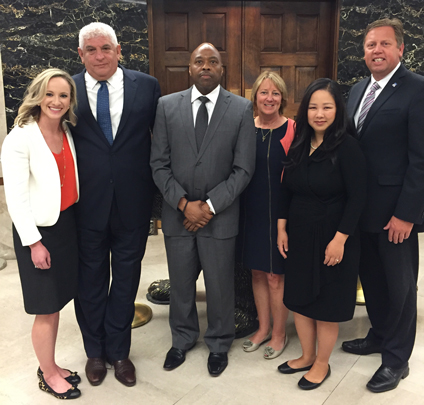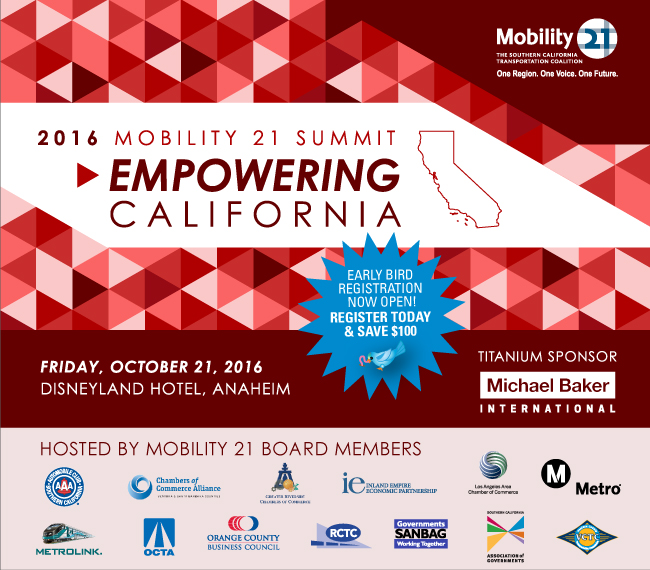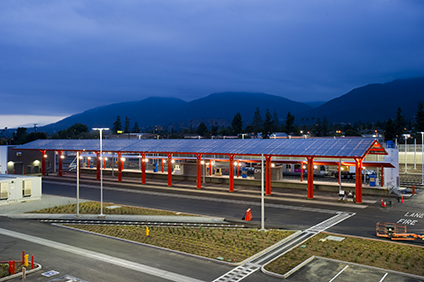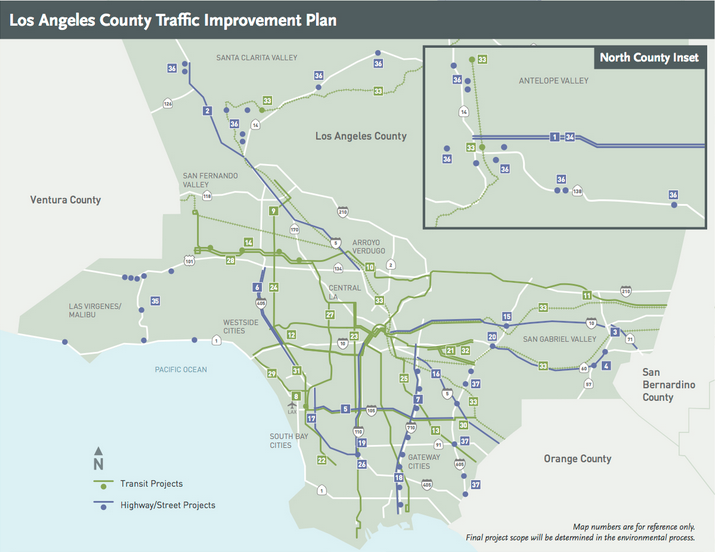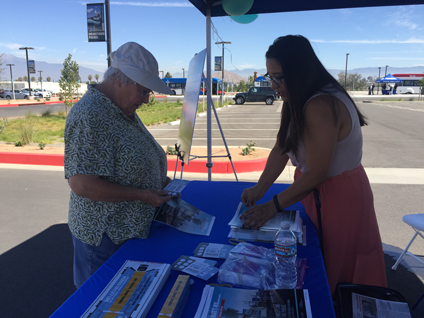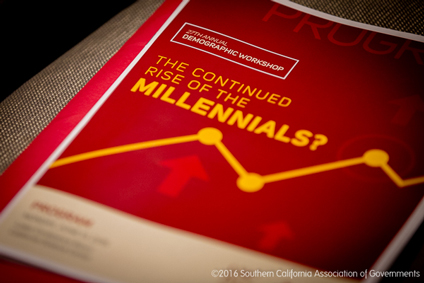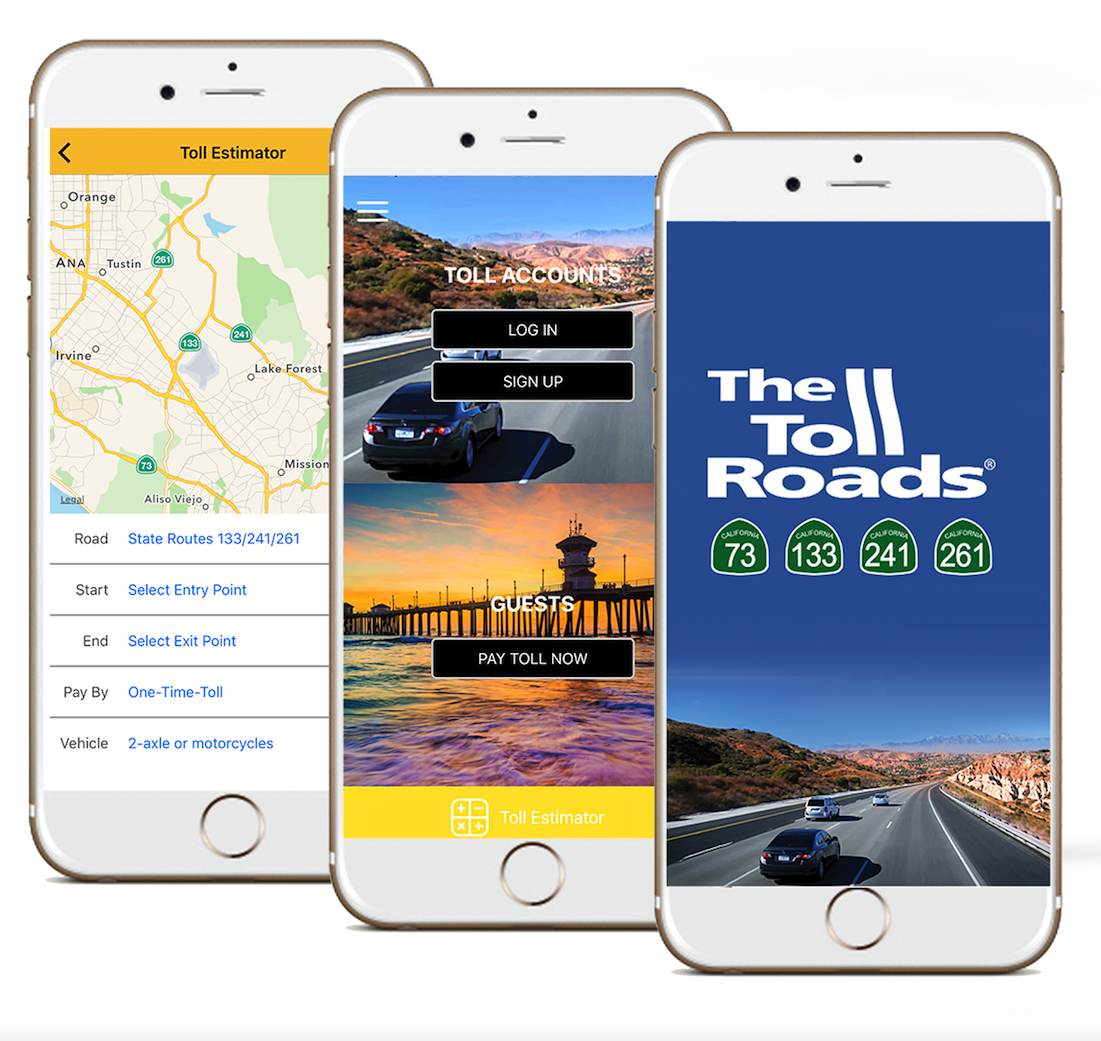Mobility 21 at Work in Sacramento:
Continue the Discussion at the Summit
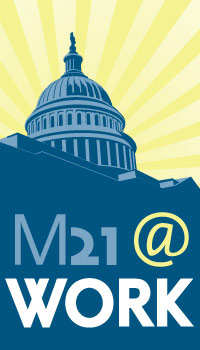 Mobility 21 Board Members met with members of the California Legislature and Administration this month to discuss key issues for Southern California’s transportation future. To continue the discussion, please join us at the Mobility 21 Summit on Friday, Oct. 21 as we take on key regional transportation policy and infrastructure issues.
Mobility 21 Board Members met with members of the California Legislature and Administration this month to discuss key issues for Southern California’s transportation future. To continue the discussion, please join us at the Mobility 21 Summit on Friday, Oct. 21 as we take on key regional transportation policy and infrastructure issues.
Left to right: Kristin Slocum, M21 Director of Operations and Communications, Hasan Ikhrata, SCAG Executive Director, Phil Washington, Metro CEO, Anne Mayer, RCTC Executive Director, Jenny Larios, M21 Executive Director and Darrell Johnson, OCTA CEO.
Mobility 21 Announces 2016 Summit Award Winners
For the past 15 years, Mobility 21 has recognized leaders in the transportation industry for their tremendous contributions to the mobility of Southern California. Mobility 21 is proud to announce the 2016 award winners! They will be recognized during the Summit on Friday, Oct. 21 at the Disneyland Hotel.
Public Sector Leader of the Year Award
Self-Help Counties Coalition (confirmed)
Private Sector Leader of the Year Award
Elon Musk (invited)
CEO, Tesla
Lifetime Achievement Award
Will Kempton (confirmed)
Executive Director, Transportation California
Join us in honoring the award winners at this year¹s Summit. Save $100 by registering by Friday, Aug. 26!
Our room block is selling quickly! Reserve your room at the Disneyland Hotel by Tuesday, Sept. 20 online today.

Mobility 21 Advisory Board Member Spotlight:
Sarah Catz
Director, Center for Urban Infrastructure
 Sarah L. Catz is the Director of the Center for Urban Infrastructure at Brandman University – Chapman University System and a Research Associate in the Institute of Transportation Studies at University of California, Irvine. She joined the Mobility 21 Advisory Board in 2015.
Sarah L. Catz is the Director of the Center for Urban Infrastructure at Brandman University – Chapman University System and a Research Associate in the Institute of Transportation Studies at University of California, Irvine. She joined the Mobility 21 Advisory Board in 2015.
During the past two decades, Sarah has been a leading transportation/infrastructure and public policy expert and has played a key role in critical transportation and infrastructure projects, both at the local and state levels. She has served as the state’s acting Deputy Secretary of Transportation as well as the project manager for The Commission on Building for the 21st Century, a California infrastructure commission that included projects within water, transportation, housing, facilities and technology areas. While with the state of California, Catz also helped secure state funding for critical infrastructure projects, including major rail projects in Southern California.
Sarah spent 10 years on the Board of Directors of the Orange County Transportation Authority and served as Chairman of the Board, and was a founding member and two-term chairperson of the Board of Directors of Southern California Regional Rail Authority (Metrolink). Sarah is currently Chairwoman of the Orange County Forum, a nonpartisan current affairs organization convening the Orange County civic community to exchange ideas, and discuss public policy issues with distinguished speakers and national leaders.
Sarah recently joined Vectis Strategies, a national public relations and public affairs firm, as Senior Partner. Prior to joining Vectis, Sarah was Vice Chancellor of External Affairs at Brandman University-Chapman University System with responsibility for community and government relations as well as advancement and alumni relations. She has also been a partner in a national law firm and operated her own public affairs consulting practice.
Sarah has been recognized by The League of Women Voters of Orange County with the “OC Woman of Achievement” Award and by OC Metro Magazine as one of “10 Women Making a Difference in Orange County.” She also is the recipient of the California Transportation Foundation Tranny Award for “Citizen of the Year” and has been named “Woman of the Year” three times by the Orange County Chapter of WTS.
Sarah received her law degree from the University of Santa Clara and her bachelor’s degree from George Washington University.
Mobility 21 Advisory Board Member Spotlight:
Steve Huff, PE
Southern California Transportation Practice Leader, Michael Baker International
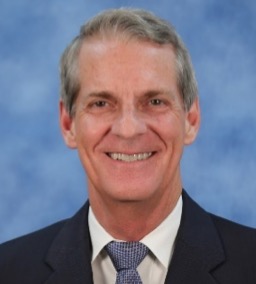 Steve Huff is Vice President and Southern California Transportation Practice Leader for Michael Baker International (formerly RBF Consulting). In this role, he advances the transportation practice and guides over 50 transportation professionals on projects ranging in size and complexity. Steve has spent his entire 33-year career with the firm, which has had a strong presence in Southern California since 1944.
Steve Huff is Vice President and Southern California Transportation Practice Leader for Michael Baker International (formerly RBF Consulting). In this role, he advances the transportation practice and guides over 50 transportation professionals on projects ranging in size and complexity. Steve has spent his entire 33-year career with the firm, which has had a strong presence in Southern California since 1944.
Michael Baker International, LLC is a leading global provider of engineering and consulting services in support of U.S. federal, state, municipal and foreign allied governments, as well as a wide range of commercial clients. With more than $1 billion in annual revenue, the firm has over 6,000 employees in over 90 locations globally.
Based in Irvine (CA), Steve has spent more than three decades working with public- and private-sector clients to improve transportation infrastructure statewide. His experience has included the design of major highway improvements and management of complex interstate freeway projects totaling over $1 billion dollars in construction costs.
Steve’s history of high-profile transportation work in Orange County includes leadership roles on the I-5/I-405 El Toro “Y” Interchange and the Eastern Transportation Corridor (SR-241). For OCTA, his more recent involvement includes leading the final design phase of the SR-57 Northbound Widening and SR-91 Westbound Widening projects. Steve’s leadership on these projects exemplifies his dedication to supporting Orange County’s Measure M2 project delivery goals.
Steve also has been integrally involved in delivering projects through Los Angeles County’s Measure R Program. For Metro, he is currently managing PA/ED for the SR-91 Westbound Widening Project and, over the last four years, has served as Project Manager for the SR-91/I-605/I-405 Congestion Hot Spots Feasibility Study and subsequent PSR-PDS documents for the I-605/I-5 and I-605/SR-91system interchanges. The Feasibility Study analyzed alternatives to improve various congestion “hot spots” along 40-plus miles of the I-605, I-405 and SR-91 freeways in Los Angeles County. These projects involve extensive collaboration with Metro, the Gateway Cities Council of Governments, Caltrans, and local cities.
In addition to his role as an Advisory Board Member to Mobility 21, Steve is Co-Chairman of the Caltrans District 12 Professional Liaison Committee and a member of the Caltrans Statewide Professional Liaison Committee. He is also an active member in ASCE (American Society of Civil Engineers) and WTS (Women’s Transportation Seminar).
Steve earned a bachelor’s degree in Civil Engineering from California State Polytechnic University, Pomona and is a registered civil engineer in California and Arizona.
Steve and his wife, Satomi Huff, live in Orange County and have two daughters (16 and 12 years old).
Summit Platinum Sponsor Spotlight:
CH2M
 Celebrating 70 years of engineering excellence, employee-owned CH2M is a leading professional services company delivering sustainable solutions to municipalities and communities in California and around the globe. We make a positive difference every day providing consulting, design, engineering and management services for vital transportation, water, energy and environmental infrastructure and resources.
Celebrating 70 years of engineering excellence, employee-owned CH2M is a leading professional services company delivering sustainable solutions to municipalities and communities in California and around the globe. We make a positive difference every day providing consulting, design, engineering and management services for vital transportation, water, energy and environmental infrastructure and resources.
Taking on our clients’ most challenging problems, we turn them upside down and inside out—solving them in ways nobody has thought of before. Together, we create new pathways for human progress, breathing fresh life, energy and enterprise into every community we touch.
To meet our clients’ biggest challenges, we tap deeply integrated capabilities across our global organization. And we draw on the exceptional skills and creativity of 22,000 teammates with an outstanding track record of expertly executing projects both big and small.
We love what we do, but we care just as much about how we work. Deep respect for our family of employees, our clients and the communities we serve guides us at every step. We aim to meet each day with integrity, an adventurous spirit and dedication to the well-being of people in our lives and in our work.
Learn more at www.ch2m.com.
Summit Platinum Sponsor Spotlight:
Automobile Club of Southern California
 For more than a century, the Automobile Club of Southern California has advocated for mobility and traffic safety improvements in California. The organization charted some of the state’s first roads, installed the first wide-scale system of road signs throughout Southern California and created maps of the rapidly growing area. Today, the Auto Club is the largest AAA club in the U.S., providing automotive, insurance and travel services to more than six million members in Southern California. The organization is dedicated to working with elected officials and the community to:
For more than a century, the Automobile Club of Southern California has advocated for mobility and traffic safety improvements in California. The organization charted some of the state’s first roads, installed the first wide-scale system of road signs throughout Southern California and created maps of the rapidly growing area. Today, the Auto Club is the largest AAA club in the U.S., providing automotive, insurance and travel services to more than six million members in Southern California. The organization is dedicated to working with elected officials and the community to:
- Improve traffic safety for all road users, including child passengers, teen and older drivers, and bicyclists and pedestrians,
- Reduce impaired and distracted driving through effective education, research, laws and enforcement, and
- Advocate for better roads, freight movement and public transit to improve the economy and quality of life in California.
As part of its efforts to deter impaired driving, which includes both drunk and drugged driving, the Auto Club has recently publicized research from the AAA Foundation for Traffic Safety seeking to better understand cannabis impairment and traffic crashes. This groundbreaking AAA Foundation research revealed that after Washington state legalized recreational marijuana use in 2012, the percentage of fatal crashes involving cannabis use doubled. To address the growth in drugged driving, the Auto Club supports more and better training for law enforcement officers to detect and convict impaired drivers, research-based impaired driving laws, and partnerships with law enforcement and judicial agencies to promote best practices in removing impaired drivers from the road.
View of Metro Gold Line Foothill Extension Maintenance Facility in Los Angeles.
Summit Platinum Sponsor Spotlight:
Parsons
![]() As a Southern-California-based company, Parsons is proud to sponsor the 2016 Mobility 21 Summit. Since 1944, Parsons has partnered with diverse local and regional government agencies and private firms to deliver some of California’s most significant projects.
As a Southern-California-based company, Parsons is proud to sponsor the 2016 Mobility 21 Summit. Since 1944, Parsons has partnered with diverse local and regional government agencies and private firms to deliver some of California’s most significant projects.
Parsons offers more than 70 years of local experience, innovation and globally recognized technologies. The firm’s skilled professionals leverage world-renowned expertise to ensure its customers’ success. With more than 15,000 employees worldwide, Parsons specializes in end-to-end design-build transportation engineering, including multidisciplinary planning, maintenance, improvements and all phases of construction and implementation.
From its headquarters, in Pasadena, Parsons has contributed to many of California’s most high-profile efforts, such as the Mid-City Exposition LRT Design-Build, in Los Angeles; California High-Speed Rail, Contract CP1; the Metro Gold Line Foothill Extension, from Pasadena to Azusa; the SR 91 Corridor Improvement Project, in Riverside; and the Thomas Bradley International Terminal, at LAX.
Click here to view full-size map of the Los Angeles County Traffic Improvement Plan.
Metro’s Board Approves Los Angeles
County Traffic Improvement Plan for
Placement on the November Ballot
The Los Angeles County Metropolitan Transportation Authority (Metro) Board of Directors approved a bold transportation expenditure plan for placement on the upcoming November ballot. The sales tax measure calls for a sustained funding approach that, if approved by the voters, would accelerate and fund a wide variety of transit and highway projects, roadway improvements and pedestrian and bike paths.
“Today’s action paves the way towards building and sustaining a world-class 21st century transportation system here in Los Angeles County to accommodate the region’s growing needs,” said Metro Board Chair Mark Ridley-Thomas. “The placement of this important measure before the voters in November is a giant step in order to improve mobility, create jobs and improve the quality of life for all of L.A. County.”
The Los Angeles County Traffic Improvement Plan would also devote billions of dollars to commuter rail, transit operations and projects to keep buses, trains and facilities in good repair. The plan would return revenues to local cities on a per capita basis — money those cities would spend on their own local transportation improvements.
“Working hand in hand every step of the way with our stakeholders during this entire process has brought together a plan of action to ease traffic, build out our rail network and enhance bus service,” said Metro Board First Vice Chair John Fasana. “It will now be up to the voters of L.A. County on whether or not they want a truly balanced transportation system for the entire region.”
In March, Metro staff presented a 40-year draft plan that would have asked voters to increase the countywide sales tax by a half-cent and to continue the existing Measure R tax for 18 years, meaning both would run through 2057. In May, the Metro Board of Directors asked agency staff to model a sustained “no sunset” scenario to determine additional benefits that could be delivered if the tax continued beyond 40 years.
“Our region is on the move — and it’s time we stop letting traffic hold us back,” said Los Angeles Mayor and MTA Board Second Vice Chair Eric Garcetti. “This bold transportation plan will relieve our congested roads, connecting our region with the robust, comprehensive transportation system we need and deserve. It also adds thousands of local jobs and the constant stream of funding we need to keep our system running smoothly for generations to come.”
Under the new sustained funding scenario, 12 projects could be accelerated from the previously presented 40-year plan. The revised plan also allows the Eastside Gold Line Extension to be built to both South El Monte and Whittier and would fund the L.A. County section of a new freeway, energy and high-speed rail corridor between the Antelope Valley and San Bernardino County.
In addition, three projects would be upgraded later in the plan: a bus rapid transit project between North Hollywood and Pasadena could be light rail; a high-capacity transit project on Vermont Avenue between Hollywood and the Green Line in South L.A. could be a subway; and a proposed bus rapid transit project on Lincoln Boulevard could be light rail.
In the plan, the sustained funding approach will increase funding for local return to the 88 cities and unincorporated areas in L.A. County from 16 percent to 17 percent starting in 2017 and increasing to 20 percent beginning in 2039. The plan will increase Metrolink funding by one percent starting in 2040.
The foundation of the plan includes a host of transportation improvement projects submitted by stakeholders across the county. Metro staff evaluated those projects against key performance metrics to determine how they would ease congestion and enhance mobility, provide better access to key destinations, improve safety, grow the local economy and enhance quality of life.
“This plan is the most aggressive yet balanced initiative in this country today,” said Metro CEO Phillip A. Washington. “It goes far beyond building and delivering projects. It includes operating and maintaining the system we build, takes full advantage of technology as it develops, and provides an opportunity to not only tackle the transportation infrastructure challenges of today, but once and for all.”
Among the challenges of a 40-year sales tax ballot measure were fewer major projects that could be built, limits on the ability to accelerate projects and fewer opportunities to leverage additional state and federal funds. A 40-year plan would not have provided ongoing funding to maintain and keep transportation systems in good repair.
Some of the projects that would be accelerated under the new sustained plan include Orange Line improvements (five-year acceleration), the West Santa Ana Branch Project – Segment 1 (one-year acceleration) and segment two (six-year acceleration), I-5 widening between the I-605 and I-710 (five-year acceleration), Crenshaw/LAX Line Northern Extension (eight-year acceleration) and the Green Line Extension to the Norwalk Metrolink station (five-year acceleration).
The plan also provides funds for paratransit for the disabled, affordable fares for seniors, students and the disabled, active transportation programs to better connect transit to surrounding neighborhoods and safety programs.
Following three months of public review and input — including community meetings and Telephone Town Halls that reached tens of thousands of L.A. County residents — new polling results show that 72 percent of those surveyed would vote for a ballot measure with a sustained funding approach. Benefits noted by respondents included keeping fares affordable for seniors, students and the disabled; creating jobs; repairing potholes; earthquake retrofitting bridges and improving freeway traffic flow. In addition, providing transportation options for an aging population was another reason that respondents said they were more inclined to vote for the measure.
The Board today adopted an ordinance that will guide implementation of the expenditure plan and a resolution requesting that the Los Angeles County Board of Supervisors place the ordinance on the ballot with specific ballot language for the November 8, 2016, countywide general election. The Board also approved a Metro staff request to add $10.9 million to the FY2017 budget to fund election related and public information activities.
The Board took the action to approve the plan today in light of the announcement of the cancellation of a Senate Transportation and Housing Public Hearing organized by Senator Tony Mendoza which was planned to further look at the proposed plan.
The new Los Angeles County Traffic Improvement Plan is available at www.metro.net/theplan.
Community members learned about the new 91/Perris Valley Line Metrolink service during a celebration event.
Community Celebrates Start of
91/Perris Valley Line Service
The Riverside County Transportation Commission and Metrolink marked the start of the 91/Perris Valley Line with a community celebration on June 18 at the new Riverside Hunter Park/UCR Station. More than 200 community members dropped by to learn about the new service, schedules, destinations, and safety.
Visitors beat the heat by exploring a parked Metrolink train and Riverside Transit Agency buses and enjoyed live music from KGGI 99.1 FM. Other attractions included face painting, giveaways, photos with the Operation Lifesaver mascot and meals. Those who visited at least three designated booths were able to redeem their stamped event “passports” for free hamburger and cheeseburger lunches.
The event was designed to thank the community and celebrate the completion of the new passenger rail service through Riverside and Perris, the first extension of Metrolink service since the Antelope Valley Line was built in 1994. Construction of the 24-mile extension began in fall 2013 and cost close to $248.3 million, from a combination of federal, state and local sources. About 25 percent of the funding is from Measure A, the voter-approved half-cent sales tax for transportation improvements in Riverside County.
Other activities were held to herald the start of service, including special events the week of June 13 at each of the four new Metrolink stations – Riverside Hunter Park/UCR, Moreno Valley/March Field, Perris-Downtown and Perris-South. A radio disc jockey and welcoming group was on site each morning to play music and greet visitors with coffee, sweet rolls and promotional materials. Staff also helped Metrolink riders become familiar with the station’s new touch-screen ticket vending machines.
On June 1, a “sneak peek” train carried business representatives, news media, elected officials and project team members on a special ride between the Riverside Hunter Park/UCR Station and the Perris-Downtown Station to give riders a chance to view the route before service began on June 6.
For more information about Metrolink and the new service, please visit www.metrolinktrains.com/pvl.
SCAG’s 27th annual Demographic Workshop highlighted the jobs-housing imbalance that is impacting younger generations.
SCAG-USC Demographic Workshop
Highlights Millennials
On Monday, June 14, the Southern California Association of Governments (SCAG) and the USC Sol Price School of Public Policy convened its annual workshop on demographic trends. This year’s event was held at the California Science Center in Los Angeles and highlighted the rise of the millennial generation. Typically defined as persons born between 1980 and 1999, millennials now number 75.4 million in the United States and make up the nation’s largest living generation, according to the Census Bureau.
According to demographers, policy makers and business leaders speaking at the conference, a gridlock of housing and jobs is impacting where and how young adults are living more than perceived preferences. In addition to a tightened job market, the economic shift that began in 2007 resulted in a sharp reduction in single-family and multifamily housing construction, creating a supply-and-demand imbalance that has hit California and Greater Los Angeles particularly hard. As millions of millennials were reaching adulthood, massive numbers of homeowners were forced back into the rental market.
To view the program and download the presentations, visit http://www.scag.ca.gov/calendar/Pages/DemographicWorkshop.aspx.
Explore The Toll Roads’ new and improved mobile app to manage accounts and pay tolls.
Paying Tolls on the 73, 13, 241 or 261 Toll Roads?
There’s a New App for That
The Toll Roads of Orange County (State Routes 73, 133, 241 and 261) released a major update to their mobile app that improves the design and enhances the functionality for customers.
The Transportation Corridor Agencies, who operate The Toll Roads, was the first toll road operator in the nation to offer a free mobile app for toll account management in 2012. The app, currently used by FasTrak®, ExpressAccount® customers and One-Time-Toll drivers who pay tolls per trip, has over 550,000 downloads. The latest update is version 3.0 and can be downloaded by searching “the toll roads” in the Google Play and Apple App stores.
Based on valuable feedback from customers, the mobile app has been completely redesigned and updated, making it easier to manage accounts and pay tolls from the palm of your hand. The updates include:
- New user interface to quickly and easily access tools and features
- Streamlined processes allowing drivers without a FasTrak or ExpressAccount to pay tolls within 5 days before or 5 days after driving The Toll Roads
- Convenient toll estimator providing drivers a tool to easily calculate the cost of their trip on The Toll Roads
- Enhanced capabilities for accountholders to manage their accounts and quickly add or remove a vehicle, request a transponder, view recent toll activity and receive notifications
“Improving customer service and providing a congestion-free drive are two important goals for The Toll Roads, and our customers and drivers get both with the new and improved mobile app” said Ross Chun, Chair of the San Joaquin Hills Transportation Corridor Agency. “Download the latest version of The Toll Roads’ app and enjoy a stress-free drive in Orange County.”
Transportation Events in the Community
Wednesday, July 13
WTS-LA: Welcome Therese McMillan
More info | Register
Thursday, July 14
WTS-SD: Women in Aviation
More info | Register
Saturday, July 16
WTS-LA: Members-Only Professional Development Half-Day Workshop
More info | Register
Wednesday, July 20
OCBC: New Skills at Work Forum
More info | Register
Wednesday, July 20
CMAA SoCal: City of LA Sixth Street Bridge Update
More info | Register
Friday, July 22
WTS-LA: Members Only – Tour of Gerald Desmond Bridge Replacement Project
More info | Register
Thursday, July 28
California Construction Expo 2016
More info | Register
Thursday, Aug. 4
OCBC: Economic Development Forum
More info | Register
Thursday, Aug. 4
CMAA SoCal: What Owners Want from CMs
More info | Register
Sunday, Aug. 14
ITE: Transportation Camp
More info | Register
Thursday, Aug. 18
CMAA: LA Metro Capital Program Update
More info | Register
Thursday, Aug. 25
CMAA SoCal: Tech Expo 2016
More info | Register
Monday, Sept. 12
CMAA SoCal: Golf Classic
Sponsor
Friday, Sept. 16
ACEC-OC: 2016 Scholarship Golf Tournament
Sponsor
Sept. 19-21
ITS California: Annual Conference and Expo
More info | Register
Thursday, Sept. 22
CMAA SoCal: 1st Annual Construction Management Industry Recognition Banquet
More info | Register
Tuesday, Sept. 27
WTS-IE: 5th Annual Softball Game
More info | Sponsor
Tuesday, Oct. 4
AAa/e: Annual Awards Banquet
More info
Oct. 9-12
Rail~Volution
More info | Register
Friday, Oct. 21
2016 Mobility 21 Summit, Disneyland Hotel
More info | Register
Nov. 16-18
California Transit Association: 51st Annual Fall Conference & Expo
More info | Register
Dec. 4-6
Self-Help Counties Coalition: Focus on the Future, Hollywood
More info

